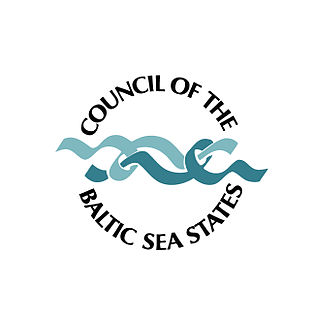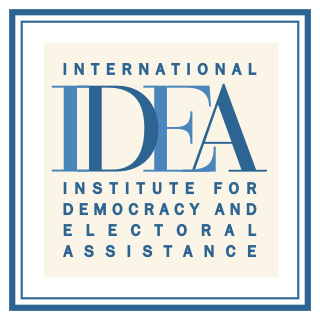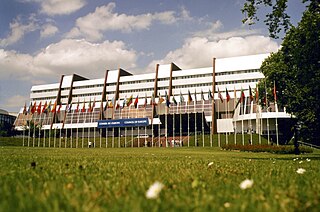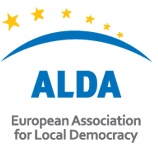
The Council of the Baltic Sea States (CBSS) is a regional intergovernmental organisation working on three priority areas: Regional Identity, Safe & Secure Region and Sustainable & Prosperous Region. These three priority areas aim to address the themes of environment, economic development, entrepreneurship, education, culture, civil security, children's rights and trafficking in human beings.

E-democracy, also known as digital democracy or Internet democracy, incorporates 21st-century information and communications technology to promote democracy. It is a form of government in which all adult citizens are presumed to be eligible to participate equally in the proposal, development, and creation of laws. E-democracy encompasses social, economic and cultural conditions that enable the free and equal practice of political self-determination.

The AEGEE, or Association des États Généraux des Étudiants de l'Europe, known as European Students' Forum in English, is the largest trans-national, interdisciplinary student organisation in Europe.
Youth empowerment is a process where children and young people are encouraged to take charge of their lives. They do this by addressing their situation and then take action in order to improve their access to resources and transform their consciousness through their beliefs, values, and attitudes. Youth empowerment aims to improve quality of life. Youth empowerment is achieved through participation in youth empowerment programs. However scholars argue that children’s rights implementation should go beyond learning about formal rights and procedures to give birth to a concrete experience of rights. There are numerous models that youth empowerment programs use that help youth achieve empowerment. A variety of youth empowerment initiatives are underway around the world. These programs can be through non-profit organizations, government organizations, schools or private organizations.

Student voice is "any expression of any learner regarding anything related to education" and describes "the distinct perspectives and actions of young people throughout schools focused on education. Tech educator Dennis Harper writes, "Student voice is giving students the ability to influence learning to include policies, programs, contexts and principles."

The International Institute for Democracy and Electoral Assistance is an intergovernmental organization that works to support and strengthen democratic institutions and processes around the world, to develop sustainable, effective and legitimate democracies. It has regional offices in Wider Europe (Netherlands), Latin America and the Caribbean (Chile), Asia and the Pacific (Australia) and Africa and West Asia (Ethiopia). The organization's headquarters is in Stockholm, Sweden.

The British Youth Council (BYC) is a UK charity that works to empower young people and promote their interests. BYC, run by young people, exists to represent the views of young people to government and decision-makers at a local, national, European and international level; and to promote the increased participation of young people in society and public life. It is partly funded by the Department for Culture, Media and Sport.

The Congress of Local and Regional Authorities (CLRA) is the pan-European political assembly representing local and regional authorities from the forty-seven member states of the Council of Europe. Its role is to promote local and regional democracy, improve local and regional governance and strengthen authorities' self-government, according to the principles laid down in the European Charter of Local Self-Government. It is made up of two chambers, the Chamber of Local Authorities and the Chamber of Regions and holds its plenary sessions twice a year at the Palace of Europe in Strasbourg, where its permanent Secretariat is located.

The inaugural session of the Black Sea Forum for Partnership and Dialogue (BSF) was held on June 4–6, 2006 in Bucharest. The Forum is a Romanian initiative, initially meant to hold annual presidential-level summits and thematic or sectoral-cooperation meeting during those annual intervals. The Forum is not meant to create new regional institutions, but rather to turn into a regular consultative process among countries of the extended Black Sea region and between this group of countries and international organizations such as the European Union. After the inaugural summit, no other summits were planned.

The European Youth Forum is the platform of the national youth councils and international non-governmental youth organisations in Europe. It strives for youth rights in international institutions such as the European Union, the Council of Europe and the United Nations.
Intercultural dialogue has long been a principle supported by the European Union and its Institutions. The year 2008 was designated "European Year of Intercultural Dialogue" (EYID) by the European Parliament and the Member States of the European Union. It aimed to draw the attention of people in Europe to the importance of dialogue within diversity and between diverse cultures.

Belarusian Liberal Party of Freedom and Progress (PFP) is a liberal political party in Belarus. Since 2003 it keeps trying to get official registration.
The North–South Centre, officially the European Centre for Global Interdependence and Solidarity, is a Partial Agreement — of the Council of Europe, the oldest political organisation of European states.
The youth rights movement seeks to grant the rights to young people that are traditionally reserved for adults, due to having reached a specific age or sufficient maturity. This is closely akin to the notion of evolving capacities within the children's rights movement, but the youth rights movement differs from the children's rights movement in that the latter places emphasis on the welfare and protection of children through the actions and decisions of adults, while the youth rights movement seeks to grant youth the liberty to make their own decisions autonomously in the ways adults are permitted to, or to lower the legal minimum ages at which such rights are acquired, such as the age of majority and the voting age.
In December 2009, the United Nations General Assembly adopted resolution 64/134 proclaiming the year commencing 12 August 2010 as the International Year of Youth.
The UCLG Committee on Social Inclusion, Participatory Democracy and Human Rights is one of the four Committees of the United Cities and Local Governments. As an autonomous network in the framework of UCLG, its stated goal is to bring together local authorities from across the world to exchange points of view and local initiatives on social inclusion, participatory democracy and human rights. Inheritor of the forums of local authorities (FAL) held in parallel to the first editions of the World Social Forum, the Committee has become a relevant stakeholder in global advocacy for human rights in the city and the Right to the City Throughout its history, the Committee been characterized by facilitating meetings and networking between progressive local authorities, with a special emphasis in the Latin American and European region. Headquartered in Barcelona, the Committee is composed by more than 100 local governments and various partner organizations.
The World Forum for Democracy is an gathering each November in Strasbourg, France to debate the complex challenges facing democracies today and foster democratic innovation. The Forum is hosted by the Council of Europe and brings together members of civil society, political leaders and representatives of business, academia, media and professional groups. Past editions have revolved around themes such as "Bridging the gap: democracy between old models and new realities", "Re-wiring Democracy: connecting institutions and citizens in the digital age" and "From participation to influence: can youth revitalise democracy?".

The European Alliance of Cities and Regions for Roma Inclusion is an initiative from the Congress of Local and Regional Authorities of the Council of Europe. The Alliance currently gathers 130 Cities and Regional authorities from 29 countries.

ALDA, the European Association for Local Democracy, is a membership based organisation established in 1999 at the initiative of the Council of Europe's Congress of Local and Regional Authorities. ALDA works on the promotion of good governance and citizen participation at the local level, focusing on activities that facilitate cooperation between local authorities and civil society in the European Union and its Neighbourhood.